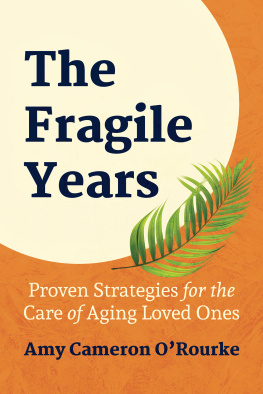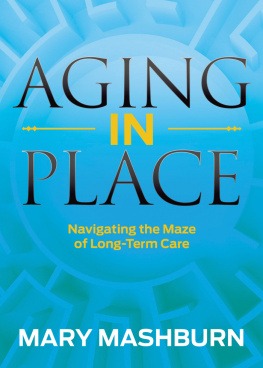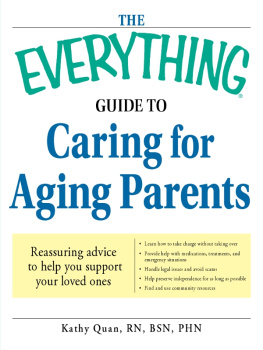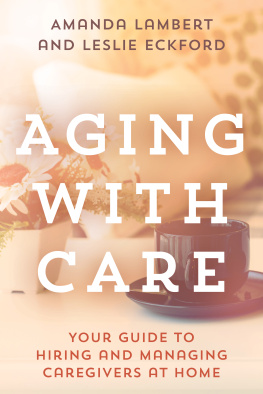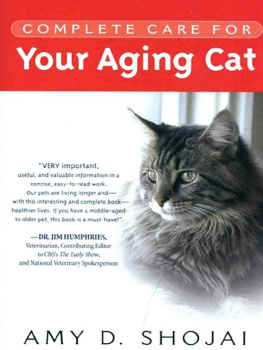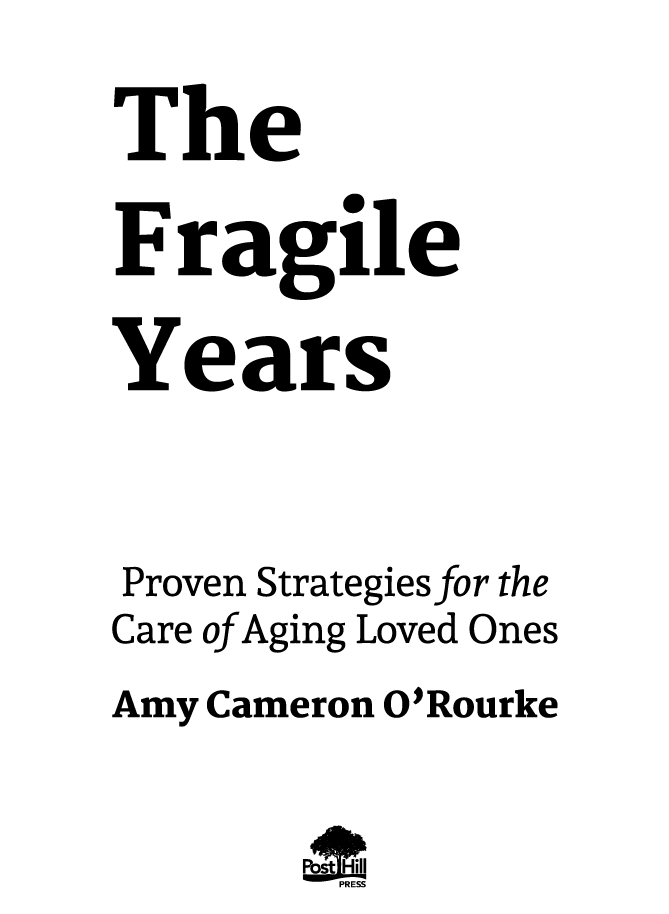
A POST HILL PRESS BOOK
ISBN: 978-1-64293-946-0
ISBN (eBook): 978-1-64293-947-7
The Fragile Years:
Proven Strategies for the Care of Aging Loved Ones
2021 by Amy Cameron ORourke
All Rights Reserved
Cover art by Cody Corcoran
Although every effort has been made to ensure that the personal and professional advice present within this book is useful and appropriate, the author and publisher do not assume and hereby disclaim any liability to any person, business, or organization choosing to employ the guidance offered in this book.
No part of this book may be reproduced, stored in a retrieval system, or transmitted by any means without the written permission of the author and publisher.

Post Hill Press
New York Nashville
posthillpress.com
Published in the United States of America
This book is dedicated to my m om and dad
and my belo ved H obey.
Contents
T his case began, as so many do, with a frantic call from a loved one.
My husband is in an acute care hospital in Orlando. He is on a ventilator and getting dialysis. They called and said they are discharging him, and the only place that would take him is a nursing home more than five hours away, in Georgia. My lawyer told me to call you. What can I do to stop them from sending him so far away to another state? Can yo u hel p me ?
As an advocate for aging and fragile clients and their families, I deal with these situations every day. Hospitals do not want to care for long -t erm patients, especially those on ventilators. It is not cost -e ffective for them to have a hospital bed tied up for that long with a patient whose condition is unlikely to improve. They are not paid to maintain the care of a patient, only to c ure them.
That is the economics of the situation from the hospitals point of view. I have a different point of view. My job is to fulfill the wishes of my clients and make sure they get the best possible care for the best quality of life in the time they have remai ning.
I am in the profession of Aging Life Care Management, which means I handle similar cases on a daily basis. All too often, hospitals announce that they are discharging fragile patients to places that are far from family because they claim there are no facilities that will take them. And sometimes, tha t is true.
Hospital discharge directors arent evil people. They have very difficult jobs governed by numbers, not by emotions. I dont attack them or threaten them in these situations. I offer to work with them to find a better solution. And I know that they know this: hospitals and skilled nursing facilities must ensure a safe discharge of their patients. So, the law is o n my side.
My first words to the discharge staff member in this case were: This patients wife lives in Orlando. She is not moving to Georgia, and her husband is not going to Georgia. Based on what his wife has told me, he may be dying, and if that is the case, he is not going anywhere until our nurse care manager can assess his condition and determine whether it is safe to move him. You might be mad at me now, but you and I are going to become best friends as we work out a nice discharge plan. Rest assured, we will become fri ends.
Hospital discharge staff members often do get frustrated and angry if anyone interferes with their discharge plans for patients. They consider such people to be a barrier. The discharge staff members are under a lot of pressure to clear out unprofitable patients who are at risk of d ying.
My carefully chosen words were the equivalent of saying checkmate in a game of chess. Once a family member or advocate questions the safety of moving a patient, the hospital must give them time to evaluate the patients condition and find a safe place for that per son t o go.
Now, this case was more complicated than most due to the timing. This occurred in March of 2020. We were experiencing the first wave of the Covid -1 pandemic, which made an already difficult situation about one hundred times more diffi cult.
As everyone knows by now, the coronavirus hit nursing homes and other long -t erm care facilities for the aging harder than anyw here else.
Residents of long -t erm care facilities constitute less than 1 percent of the U.S. population, yet 43 percent of all COVID -1 deaths through June occurred in those places. The number has changed little since, according to an AARP report, which said there were more than one hundred thousand deaths caused by the coronavirus among residents and staff of US long -t erm care facilities between March and Thanksgivin g of 2020.
In the spring and summer of 2020, I joined my colleagues in Care Management across the nation and worldwide as we had to make a dramatic shift. We went from serving as advocates for older adults to being more like special forces combatants at war. Our enemy was this highly contagious virus that was particularly deadly for our fragil e cli ents.
Nursing homes went into lockdown during the pandemic, and rightfully sono visitors, including their family and their advocates like me and my team. Many people called me during this period because they were upset that they could not visit their family members in nurs ing h omes.
My stance was always to support the nursing home administrators who were trying to protect all of their residents and staff members from being infected with the v irus.
To help our clients and their families, my team took on a new role in addition to our usual responsibilities. We became like the Geek Squad at Best Buy or the Apple store. We trained many people on how to use FaceTime, Zoom, Houseparty, and other apps to communicate remotely with their loved ones and their caregivers inside the facilities during the quarantine. We also dropped off laptops, iPads, and other devices at nursing homes for clients who did not have their own.
There was no preparing for a crisis like the pandemic. We handled it case by case, minute to minute, hour to hour, day to day, as best we could. We juggled many duties, many clients and families, and fought man y bat tles.
Some we lost. So me we won.
My team did manage to keep the Orlando hospital from sending the dying man to Georgia, far from his wife and family. He did not have the coronavirus, but his final days were definitely impacted by it, just as so many ot hers were.
This gentleman was seventy -e ight years old, and hed had a stroke on the golf course. His partners called 911, and doctors resuscitated him in the ER, but the poor guy never regained full cons cious ness.
After I was called in as the familys advocate, my team had intense conversations with the hospital. I managed to get my companys care manager, Valerie, a registered nurse, inside to evaluate his condi tion.
After seeing him, Valerie could not understand why they wanted to discharge this patient and have him transported to Georgia. He was basically on life support with a ventilator. She believed that any attempt to move him would result in his immediate death. We also had doubts that any Georgia facility would really accept a critically ill patient on a ventilator, especially during the Cov id cr isis.
With the coronavirus numbers ramping up every day, ventilators were hard to come by, and most facilities were not accepting new patients due to concerns about contamination from the v irus.
These are very difficult situations even in normal times. It is all too common for hospitals to do all they can to discharge patients who are dying, just so they can keep their statistics up and their r isks down.
Next page
